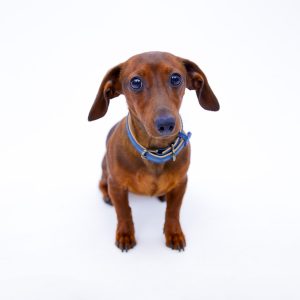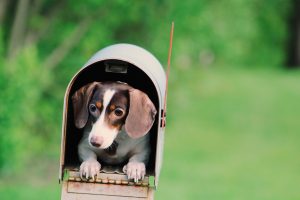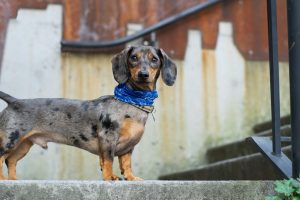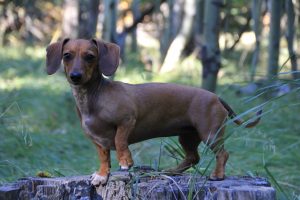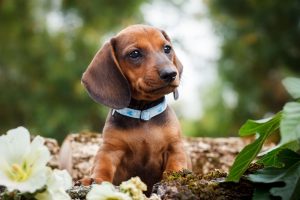Dachshund and the Basset Hound: A Comparison

Physical Characteristics: Understanding the unique body structures of Dachshunds and Basset Hounds
Dachshunds and Basset Hounds are two breeds of dogs with distinct body structures. Dachshunds are known for their long, low-to-the-ground bodies, which are ideal for their historical purpose as hunting dogs. They have a compact frame and short legs, allowing them to maneuver through small burrows and tight spaces. Additionally, Dachshunds have long ears that rest low on their head, emphasizing their adorable appearance.
On the other hand, Basset Hounds have a unique and unmistakable body structure. They have a heavy bone structure, with a large, barrel-shaped chest and long, droopy ears that hang low from their head. Basset Hounds also have loose, wrinkled skin that adds to their distinctive appearance. Their short legs and long body make them appear low-slung and give them a somewhat awkward but endearing gait. Overall, their physical characteristics contribute to their ability to track scents on the ground and make them well-suited to their role as scent hounds.
Each of these breeds’ body structures serves a specific purpose, reflecting their historical roles and unique characteristics. Understanding these physical attributes can help potential dog owners determine which breed may be the best fit for their lifestyle and preferences. Whether you’re considering a Dachshund or a Basset Hound, it’s important to take their body structures into account when making your decision.
Temperament and Personality Traits: Exploring the distinct behavioral traits of Dachshunds and Basset Hounds
Dachshunds and Basset Hounds possess unique and distinct behavioral traits that make them charming companions in their own ways. Dachshunds are known for their bold and fearless attitude. Despite their small size, they often exhibit a confident demeanor, which can sometimes border on stubbornness. This breed is generally friendly and affectionate towards their human family members, often forming strong bonds. However, they may display a wary attitude towards strangers, making them effective watchdogs.
On the other hand, Basset Hounds are known for their easygoing and laid-back nature. They have a gentle and patient temperament, making them excellent family pets and companions. Basset Hounds are typically social and get along well with children and other animals. Their relaxed nature means they are generally less likely to show aggression or hostility. However, their strong scent hound instincts can sometimes lead to stubbornness and a tendency to follow their noses, making them not as easily trainable as some other breeds.
Exercise and Activity Levels: Comparing the exercise needs and energy levels of Dachshunds and Basset Hounds
Dachshunds and Basset Hounds have different exercise needs and energy levels. Dachshunds are known for their high energy levels and require regular physical exercise to stay fit and healthy. They enjoy activities such as brisk walks, interactive play sessions, and mental stimulation games. Due to their short legs and long bodies, it is important to be mindful of their exercise routine to prevent any strain on their back and joints.
On the other hand, Basset Hounds have a more laid-back and moderate energy level. While they do require regular exercise to maintain a healthy weight, they do not need as much physical activity as Dachshunds. They enjoy leisurely walks and playtime in a secure, open area. Interactive toys and mental stimulation games can also help keep them entertained. It is important to note that Basset Hounds have a tendency to become overweight, so monitoring their exercise and diet is crucial to their overall well-being.
Grooming and Maintenance: Discussing the grooming requirements and maintenance for Dachshunds and Basset Hounds
Dachshunds and Basset Hounds have different grooming requirements and maintenance needs due to their distinct coat types. Dachshunds have short, dense coats that require minimal grooming. Regular brushing with a soft brush or grooming glove helps to remove loose hair and keep their coats shiny. However, it is important to note that Dachshunds are prone to shedding, especially during certain seasons, so be prepared for some hair around the house. Additionally, Dachshunds have long, floppy ears that need regular inspection and cleaning to prevent the buildup of wax and debris that can lead to infections.
On the other hand, Basset Hounds have a short and dense coat that also sheds moderately. Regular brushing with a bristle brush or a grooming mitt is necessary to minimize shedding and keep their coat healthy. However, the most distinctive feature of a Basset Hound is their long, droopy ears. These adorable ears require regular cleaning and drying to prevent infections and other ear-related issues. It’s important to keep their ears dry and free of moisture to avoid any discomfort or health problems. In addition to their coat and ear care, both breeds benefit from regular nail trimming, dental care, and routine bathing to maintain overall cleanliness and hygiene.
Trainability and Intelligence: Analyzing the trainability and intelligence levels of Dachshunds and Basset Hounds
When it comes to trainability and intelligence, Dachshunds and Basset Hounds display contrasting behaviors. Dachshunds, known for their stubbornness, can be a challenge to train. They tend to have a strong-willed nature and often require consistent and patient training methods. On the other hand, Basset Hounds are more laid-back and may not respond as quickly to training. They can be easily distracted and may need extra motivation to stay focused. However, with proper techniques and positive reinforcement, both breeds can be trained effectively.
In terms of intelligence, Dachshunds are generally considered to be highly intelligent dogs. They have been bred for various tasks, such as hunting, which requires problem-solving skills and independent thinking. Basset Hounds, on the other hand, are known for their strong sense of smell rather than their intellectual capabilities. While they may not excel in obedience training, they possess a remarkable ability to track scents and are often used as scent detection dogs. Despite their differing levels of intelligence, both breeds have their unique strengths, and with the right approach, can be trainable.
Health Concerns: Highlighting the common health issues associated with Dachshunds and Basset Hounds
Dachshunds and Basset Hounds, like any other dog breed, are prone to certain health issues. Dachshunds, with their long bodies and short legs, are susceptible to back problems, including intervertebral disc disease and spinal injuries. Their unique anatomy puts them at greater risk of developing herniated discs, which can cause mobility issues or even paralysis. Additionally, their elongated ears make them prone to ear infections, so regular cleaning and maintenance are necessary to prevent discomfort and hearing problems.
Basset Hounds, on the other hand, are known for their droopy skin and long ears, which can lead to skin issues and ear infections. The folds of skin around their face and neck can trap moisture and dirt, increasing the likelihood of bacterial or yeast infections. Furthermore, Basset Hounds are susceptible to obesity due to their love for food and their low activity levels. This can put additional strain on their joints and increase the risk of other health issues such as arthritis and heart problems.
While these health concerns are common in both Dachshunds and Basset Hounds, it is important to note that not every dog will be affected. Proper care, regular vet check-ups, and a healthy lifestyle can help minimize the risks and ensure a long and happy life for these beloved breeds.
Compatibility with Families and Children: Evaluating how Dachshunds and Basset Hounds interact with families and kids
Dachshunds and Basset Hounds are both known for their friendly and sociable nature, making them great companions for families with children. Dachshunds are often described as charming and affectionate dogs, forming strong bonds with their human family members. They tend to be playful and enjoy spending time with children, although their small size may require supervision to prevent accidental injury. Basset Hounds, on the other hand, are known for their gentle and patient nature. They have a calm demeanor and are often tolerant and protective, making them excellent around kids. However, it is important to teach children how to approach and interact with these dogs in a gentle and respectful manner to ensure a harmonious relationship.
Adaptability to Living Environments: Examining the adaptability of Dachshunds and Basset Hounds to different living spaces
Dachshunds and Basset Hounds have different levels of adaptability to various living environments. Dachshunds, with their small size and short legs, are known for their adaptability to apartment living. They can thrive in smaller spaces and are content with indoor activities. However, it is important to provide them with regular exercise and mental stimulation to prevent obesity and keep them stimulated. On the other hand, Basset Hounds, with their larger size, may not be as suitable for apartment living. They require more space to roam around and enjoy outdoor activities. Consequently, a house with a yard would be more suitable for Basset Hounds, allowing them to explore and satisfy their natural instincts.
When it comes to adaptability, both breeds can adjust to different environments if provided with the necessary care and attention. Dachshunds can adapt well to different living arrangements, whether it’s a small apartment or a larger home, as long as they receive the love and attention they crave. Basset Hounds, being a more laid-back breed, are generally adaptable to different living spaces, as long as their exercise and mental stimulation needs are met. Ultimately, the adaptability of both Dachshunds and Basset Hounds relies on the owner’s ability to create a suitable living environment that caters to their specific needs.
Socialization and Interaction with Other Pets: Understanding how Dachshunds and Basset Hounds get along with other animals
Dachshunds and Basset Hounds, like any other dog breed, have their own unique socialization needs and tendencies when it comes to interacting with other animals. While both breeds are generally friendly and sociable, it is important to consider their individual personality traits and temperaments when introducing them to new furry friends. Dachshunds, known for their keen hunting instincts, may display a more assertive and territorial behavior towards other animals. This can be managed through early and consistent socialization, allowing them to develop positive associations and appropriate manners when interacting with other pets. On the other hand, Basset Hounds tend to be more easygoing and get along well with other animals. Their relaxed and gentle nature makes them generally compatible with other pets in the household, including cats and smaller dog breeds. However, like any interaction between animals, it is crucial to supervise their encounters and provide a safe and controlled environment to prevent any potential conflicts. Whether it’s a Dachshund or a Basset Hound, slowly introducing them to new animals and providing positive reinforcement can promote healthy relationships and ensure harmonious coexistence in multi-pet households.
Choosing the Right Breed for You: Providing guidance on selecting between a Dachshund and
When it comes to choosing the right breed of dog for you, there are several factors to consider. Both Dachshunds and Basset Hounds are popular choices, but they do have their differences. It’s important to take into account your lifestyle, living environment, and the specific needs of each breed.
If you are looking for a small to medium-sized dog with a playful and lively personality, a Dachshund may be the right fit for you. Dachshunds are known for their distinctive long bodies and short legs, which make them excellent diggers and hunters. They are generally friendly, affectionate, and good with children, making them a great choice for families. However, it’s essential to remember that Dachshunds require regular exercise and mental stimulation to prevent boredom and potential behavior issues. Overall, if you’re an active individual or family who enjoys outdoor activities, a Dachshund might be the perfect companion for you.


